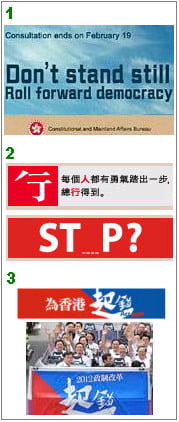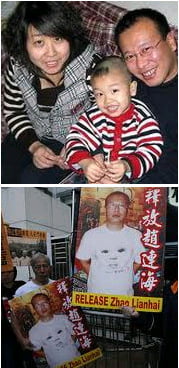Just a few days of 2010 left – but that’s still long enough for Hong Kong to push Beijing around for a second time in one year. This is noteworthy, as the last such display of Hongkie-power was in 2005, when the Central People’s Government finally kicked hapless Chief Executive Tung Chee-hwa out of office after the population’s mild-mannered but unmistakable semi-uprising in 2003.
 Beijing’s first climbdown at the hands of the Big Lychee in 2010 was in May-June, when the Chinese Government’s emissaries here deigned to meet members of the Democratic Party. It was practically the first time they had acknowledged the very existence of the group that traditionally wins the most convincing vote in the city’s polls.
Beijing’s first climbdown at the hands of the Big Lychee in 2010 was in May-June, when the Chinese Government’s emissaries here deigned to meet members of the Democratic Party. It was practically the first time they had acknowledged the very existence of the group that traditionally wins the most convincing vote in the city’s polls.
After years of refusing even the slightest meaningful move towards more representative government, someone in Beijing had finally accepted a need for the Big Lychee’s administration to have at least a make-believe popular mandate at some stage in the future. But, if only to save face, it was necessary to push through a similar reform package for the 2012 elections as that vetoed by pro-democracy legislators over four years earlier. More easily said than done: three advertising campaigns failed to rouse public support.
The Democratic Party dangled the prospect of voting for the package this time if it contained certain (convoluted and mainly inconsequential but symbolically important) elements. Hong Kong and local Beijing officials, echoed faithfully by the city’s pro-Communist Party loyalists, had rejected this idea repeatedly. After the meeting, however, Beijing blinked and announced that the DP’s demand would after all be met – leaving the CCP’s local apologists looking humiliated and stupid. The Hong Kong media emphasized the split this caused in the pro-democracy camp; the real story was that China’s authoritarian rulers had bowed to the wishes (probably at the frantic urging of Chief Executive Donald Tsang) of democratically elected representatives of Hong Kong people.
The celestial court’s second Hong Kong-prompted backtrack of 2010 came just a few days ago, when Zhao Lianhai, campaigner for the victims of the tainted milk scandal, was apparently released from prison. He was sentenced to two-and-a-half years for inciting public disorder, just one month after the announcement in early October that Liu Xiaobo had been awarded the Nobel Peace  Prize. There was a worldwide outcry at the sheer monstrousness of jailing someone for complaining about his and other people’s kids being poisoned, but the reaction in Hong Kong must have hit hardest.
Prize. There was a worldwide outcry at the sheer monstrousness of jailing someone for complaining about his and other people’s kids being poisoned, but the reaction in Hong Kong must have hit hardest.
The Big Lychee’s pro-communist camp joined in, with several local delegates to the National People’s Congress and other bodies protesting for Zhao’s release. The last time some of them dared speak out against the Party line in this way was in 2006, when journalist Ching Cheong was jailed on trumped-up espionage charges. On that occasion they obeyed the command to be silent, but this time a few of them proved more stubborn. Principled, even. (It is a fascinating question how these people – at least the ones without a commercial agenda – manage to suppress or contort their consciences to order, year after year. It must get frustrating and exhausting.)
Zhao has not received justice. He seems to have been let out on spurious health grounds on condition that he confess and muzzle himself (except supposedly to ask everyone to stop talking). The Party and its absurd legal system cannot be in error, so we get this almost infantile charade. Beijing’s officials in Hong Kong are now telling everyone to shut up, an implicit way of saying, “OK, you’ve got what you want.”
Perhaps our local patriotic camp were spurred into action because they still felt bitter about being tossed aside when the Central Government decided to let the evil Democratic Party boss it around last June. It is quite possible that the egregious treatment of Zhao, or at least what it did to China’s image, provoked controversy behind closed doors in Beijing, and the local loyalists encouraged a re-think – or indeed were used in order to prompt one.
As with the slight shift of direction over the 2012 electoral reforms, the semi-freeing of Zhao Lianhai is hardly a retreat from one-party despotism. But to kick back at least a bit against the supposedly unchallengeable sovereign power and get even a slight response is something. And there’s no other part of China to do it.

If you really want to stir things up you should ask for a posting to East Turkestan or to Shanghai or to the inflation-ravaged hinterlands. Nothing doing for you in Hong Kong.
Happy new year! Disappointed not to see a Cap’n Beefheart obituary last week, though.
It sounds as if Beijing and the Vatican have quite a lot in common. Both get incensed, or at least have their feelings hurt, when anyone dares criticize them. They both claim to be infallible and come up with endless exhausting rationalizations for their decisions, which were never wrong.
Now I understand why they are pissed off at each other over appointing bishops, they are too much alike and they can’t stand to see their own negative qualities in each other.
Good observation on the unique role of Hong Kong in China affairs, though the recent warning from the HK and Macao Affairs Office Director that “the well should stay clear of the river” should also be noted.
Happy New Year!
Bugger orf to Phyllis and Sir C – we lurve you, Hem!
And here is to best New Year ever!
with our very good wishes for 2010
from the Appalachian buffalo-spotting unique fan club (8 members known, but counting…)
Yanks Go Home.
Ah Appalachian, I know you’re probably an inbred hick if that’s where you’re from, but I wasn’t picking on Hemlock I was agreeing with him you illiterate rube.
Happy new year, by the way.
One of the best posts of the year.